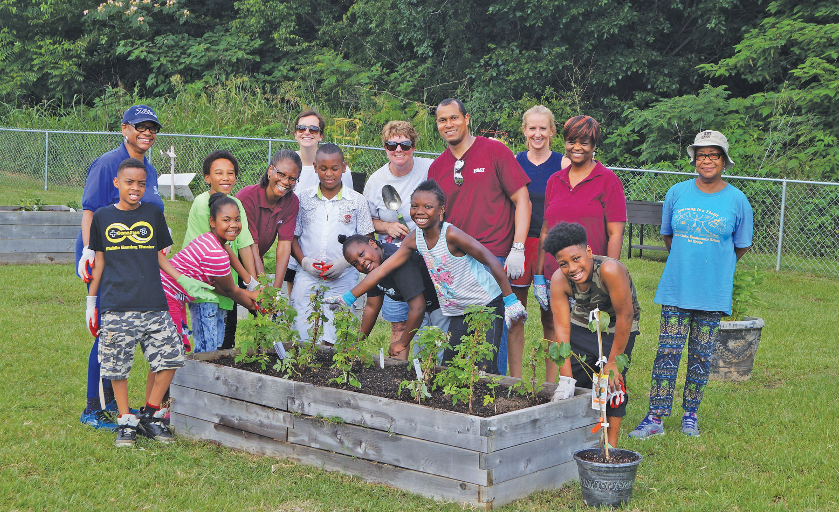
By Ariel Worthy
The Birmingham Times

Carolyn Taylor, nutrition coordinator for the A.G. Gaston Boys and Girls Club, remembers when home gardens were part of the community.
“My parents had four in our yard. It’s important because you can see it grow, nurture it,” Taylor said. “I used to go in the garden and just eat red tomatoes. That’s a delicious taste.”
The A.G. Gaston Boys and Girls Club Teaching Garden Revitalization Project aims to bring back the feel of the community garden by teaching youth how to grow their own fruits and vegetables, and learn the benefits of a healthy diet.
The AGGBGC in West End partnered with BB&T Bank to teach students the importance of gardening this month by planting tomatoes, peppers, squash, zucchini, corn, grapes, blueberries, blackberries and various herbs.
“Everything we’re doing here at the A.G. Gaston Boys & Girls Club is about having a better diet, eating nutritiously, to get away from the snack machine and all of these things that are making our kids obese,” Taylor said. “We try to teach them healthy eating habits.”
Taylor will oversee the children as they water and keep weeds out of the plants.
“Weeds stunt the growth of the vegetables, so they’re going to have to keep the garden clean,” Taylor said.
Three years ago, AGGBGC partnered with the American Heart Association (AHA) to establish its first Teaching Garden.
Frank E. Adams Jr., president and CEO, and former member, of A.G. Gaston Boys & Girls Club said the garden addresses a number of issues.
“This community also has problems with being a food desert,” said Adams. “We want our young kids to know that food doesn’t necessarily come from a grocery store; someone took the time to plant something, so they can enjoy it.”
Adams said he hopes to share with the children and their parents that “eating healthy isn’t expensive.”
“Everyone can have a garden in their yard, no matter how big or small it is. We want to encourage our kids to enjoy being outside, and the fun of gardening,” he said.
It also provides a sense of accomplishment for the students, he added.
“When the tomatoes, okra and corn starts to grow, they can pick it and prepare it in our kitchen. It’s full circle . . . they know they took care of them, and they have a sense of ownership and pride. It’s good for them to know with hard work and determination they can see their success.”
The lessons they learn in the garden can have a larger meaning, he said.
“The kids have greater sense of responsibility; they know the plants will do well if they give the time and attention it needs. We want that to spread to their human relationships,” he said. “Things have to be nurtured for a plant to grow and bear fruit it has to be watered, cared for, and watched.”
Three students, 12-year-olds Jamari, Isaiah and Maximus continued to help in the garden after the rest of their classmates went inside.
“I think it’s an awesome place to calm people down who are in stress mode, and to see the beauty of the garden – the tomatoes, plants, and the peppers, especially.” Isaiah said.
Being in a garden was familiar for Jamari.
“My grandma has plants at her house and I knew a little bit, but now I know a lot about gardening,” he said.
The three said they learned important, but simple steps in gardening, like how to water the plants.
“You can’t water the leaves because they would burn up, you have to water around the middle so that it can get to the bottom of the plant.” Isaiah said.
Alex Bumpers, portfolio manager at BB&T and board member of the Boys & Girls Club, brought a few employees to volunteer at the garden.
“It’s been amazing. Part of our mission at BB&T is to support the communities we serve, and this was great for us.”
Bumpers also was happy to see the excitement from the young gardeners.
“[Isaiah] talked about possibly going into agriculture when he gets older. I feel like we had a little to do with that, I’m not sure if that was on his plate, he can do so much.” Bumpers said. “He said ‘I might want to do this for a living.’ I thought that was pretty powerful.”





